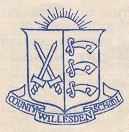|
Home_Page
Whos Who
Pupils
artsphotos
classphotos
schoolphotos
sportsphotos
otherphotos
School
Staff
Old Uffs
Magazines
Committee
News/Events
Links
For more info', email
OldUffingtonians
| |
Irene Hough (nee Riley) -War Memories of the School
Between 1939 and '43 many of us had been
shunted from school to school because of bombing and subsequent evacuation
so we came from all quarters. I joined 1c in 1943 and had the art
room as a form room and Miss Hastings as class teacher. Only one
other girl came from my Wembley primary school and I remember being
impressed by what I thought of as an exotic mix in my new environment.
In the second year I was again evacuated up north to a girl's High School
housed in the basement of the local technical college. This contrast
made me realise how lucky we were under the benevolent rule of Mr. Wallis
and surrounded by a playing field. On my return, walking with Miss
Edgell from the trolley-bus at Jubilee Clock she asked where I had been.
Upon hearing I had been at a girls high school she replied, “Ah! I thought
you were less flighty than before”. I was shattered by this
judgment. I thought I was a good girl.
Games, with cold cloak-rooms and no showers were nevertheless enjoyable,
and though we didn't appreciate it at the time, school dinners were a
daily miracle. Supplies were so limited and fuel sometimes
intermittent so the dinner ladies had a thankless task.
Our air-raid drill consisted of going to the front corridor between the
hall and the library where there were blast walls by the outside doors and
sticky tape on the windows but I remember looking at all that glass and
feeling not safe at all. Miss Edgell took needlework as well as P.E.
and I remember learning to darn and patch to such a high standard that it
would have satisfied a Victorian governess. Later Mrs. Smith was our
form mistress when her children were small and I recall her cycling around
with a toddler in the baby seat on her way to some child-care before
registration.
Sixth form memories are the most vivid. Miss Moffatt taught Botany
and Zoology, nearly half of my Higher Certificate course and I owe her a
great deal. Not only because of a mutual love of the subject, but
also because she made me WORK and she also made me think about my
vocabulary and clarity of expression. (Another cutting remark:- When I got
engaged a couple of years after leaving school her only remark was “What a
waste”).
Miss Stevenson taught us Geography and I think did all the work for us in
that she made it all seem so logical and easy. The only thing I can
remember puzzling over was map projections. She was also careers
mistress and was a great help with advice about various medical schools.
(Her brother was a doctor at St Mary's Paddington if I remember rightly.)
A most cultured, industrious and elegant lady.
School games teams, drama and friends made the sixth form a rich
experience. Table tennis in the prefects room was also a highlight.
We did prefects duty conscientiously, but I'm not sure how effective we
were. I followed Margaret Gibbs as Head Girl for a short time.
David was doing National Service when we married, so after working for the
MRC in the biophysics department at Kings (the spiral helix was being
assembled in a side room at the time), I became an RAF wife. We had been
'marched in' to officers' married quarters at Scampton two days after we
were married, and a year later joined the occupation forces in Germany.
I developed a taste for teaching whilst doing a bit of untrained emergency
supply work on airfields and we both learned Dutch whilst living over the
border for a couple of years. This made a difference to the way our
lives developed. On return to a UK posting I trained as a teacher
and on demob, after seven years, David returned to his original love of
books and languages. (He can tell his own story).
I taught primary and some secondary (mainly general science and biology)
but ended up teaching physically handicapped children. Then
Manchester offered a new degree in Special Needs at the time of the
Warnock Report, and Manchester Education Committee generously let me have
a sabbatical to take it. From my pupils I remember most the
extremely bright children trapped in non-functioning bodies. By 1980
single-switch programmes for computers were being developed at UMIST and
this was a boon for such children. They could not only do their work by
merely rolling their heads, but they could also be naughty for the first
time in their lives by playing games when they thought I wasn't looking.
We brought up three children (I had nine years off) who are all married
with families, and we now have five grandchildren aged from six to
twenty-four.
We have had a good 18yr. retirement so far, with many interesting holidays
and are just beginning to slow down a bit. (Walking holidays are beyond me
now).Irene Hough (nee
Riley) |
|
